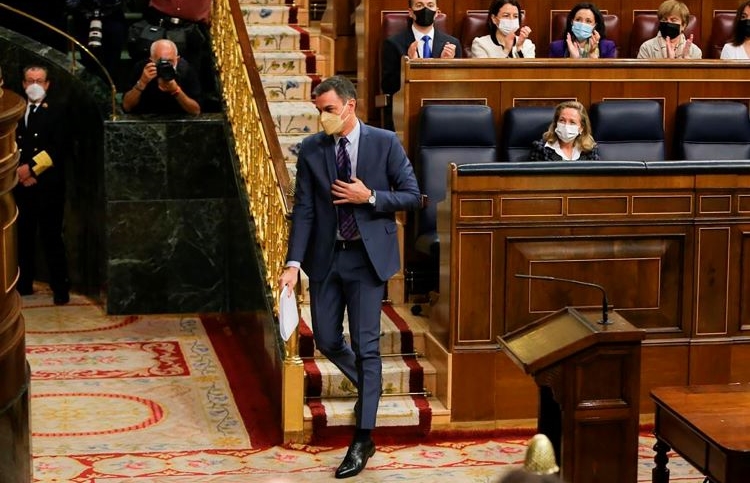Eduardo González
The need to overcome energy dependence on Russia starred yesterday in the official visit to Spain of the Prime Minister of the Netherlands, Mark Rutte, which took place a few days after the European Council granted the two Iberian countries, Spain and Portugal, the right to manage their own energy prices.
“When Spain and the Netherlands are able to reach an agreement on some issue, the EU as a whole is closer to reaching an agreement on this issue,” declared the President of the Government, Pedro Sánchez, during the presentation of the 16th Charles of Antwerp Memorial Lecture, given by Rutte in the auditorium of the Prado Museum under the sponsorship of the Ramón Areces Foundation and entitled A European response to the new reality.
The two governments have maintained important differences during the negotiations on the European recovery fund after COVID-19 and regarding the Spanish proposal for a tax on energy prices and the decoupling of gas and electricity prices, but in all these debates “Prime Minister Rutte defended the interest of his country without losing sight of the general interest of the EU, and understood that Europe should give a common response to these challenges, in which either we all win or we all lose,” Sanchez continued.
“This is exactly what we are doing in our response to the war posed by Putin,” he continued. “Over the last few weeks, our main asset has been our unity and we have seen this unity in the sanctions passed, with four packages of an unprecedented dimension,” but “defending our values and expressing our solidarity with Ukraine come at a cost, as we see now with energy prices, and that is why unity will be essential in our response to face the economic consequences of the war,” he warned.
“I am convinced that the European response to the pandemic and the war will also serve us to change stereotypes and preconceived ideas, such as the idea that northern and southern European countries have antagonistic visions of life,” Sanchez continued. “We do not want an EU of antagonistic blocs because we are not; Spain and the Netherlands have shared common positions on common issues and have led Europe’s strategic autonomy so that we can guarantee our own security and defense,” he recalled.
However, he warned, “autonomy also means that we have to reduce our dependence on energy and critical raw materials, semiconductors, artificial intelligence or on two fundamental issues such as health or food; these are examples of how, in changing times, such as the ones we are in, we have to show flexibility,” he added.
Rutte: “Spain and the Netherlands do not agree on everything, but they do agree on the crucial issues”
For his part, Mark Rutte acknowledged (and gave as an example the painting The Surrender of Breda, by Velázquez, taking advantage of his presence at the Prado Museum) that, throughout “their common history, Spain and the Netherlands have been on opposite sides, there have been conflicts, but there has also been connection.” “Spain and the Netherlands are partners firmly rooted in Europe, but they also have a very broad vision of the world, and while we may not agree on everything, when it comes to crucial issues we are very much in agreement,” he continued. “We are leaders on European climate ambitions, for example,” and in the spring of 2021, “President Sanchez and I presented our common vision on strategic autonomy,” he recalled.
According to the Dutch prime minister, the “geopolitical earthquake” created by the Russian invasion of Ukraine makes it necessary to “build a stronger and more resilient Europe, a Europe that can defend its way of life, a Europe that is autonomous but also outward-looking.”
To that end, Rutte stressed the need to implement “structural reforms” to make the European economy “stronger and more resilient.” “The recovery fund by COVID provides us with the perfect opportunity,” because “this financial support goes hand in hand with the necessary reforms, and you only have to look at the smart investments that are happening all over Europe, especially here in Spain,” he continued. “We can give countries more time to reduce their debt if we see that they are strengthening their economies,” and for this it is very important “the supervision by the European Commission to make sure that countries comply with the agreements,” he added, referring to one of his particular workhorses during the fund negotiations.
On the other hand, he warned, “we can only maximize the EU’s influence if we are less dependent on third parties, especially in important areas such as energy.” “It is only now, when we have decided that we want to stop buying gas from Russia, that we have realized how vulnerable our dependence on Russia has made us, and this we have to change as soon as possible,” she said. This “is not going to change overnight”, but “what we can do now is to change suppliers, look for alternative sources, including nuclear energy”, and, as a “longer-term solution, increase the supply of green energy and do everything possible to increase the source of renewable energies in our energy mix, and here Spain is a leader”, he stressed.
Likewise, he stated, it is necessary for “our markets to be better aligned” and, therefore, it is “a strategic necessity to connect the Iberian Peninsula with the EU energy market, something that has not yet been done, and not because of Spain or Portugal.” “I want Spanish solar energy to be able to power our light bulbs in the Netherlands and Dutch wind energy to bring electricity to Spain and Portugal, we must make our energy supply more sustainable because it is a win-win investment,” said Rutte, who at the end of this event moved with Sánchez to the Moncloa Palace for a meeting and was also received in audience by King Philip VI at the Zarzuela Palace.







